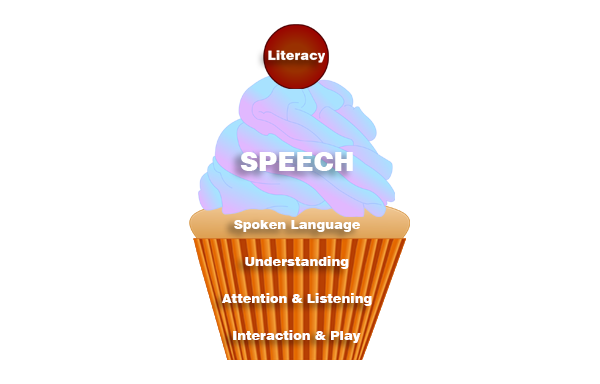What do we mean by speech and language?
Here at Speech Link Multimedia Ltd our focus is good communication and we are mindful that sometimes speech and language therapists can be guilty of using technical terms that may not mean the same thing to parents as they mean to us. It is really important that when we use terms such as ‘speech’ and ‘language’, that we are all understanding and speaking about the same thing.
The word ‘speech’ is often used every day to refer to the general concept of somebody talking, however we need to draw on lots of different skills to be able to talk successfully. We use language to choose the right words and put them in the right order to construct our message, and we use speech to produce the sounds needed to make up those words.
When we are talking about language, we mean the words and sentences that we understand and use to communicate. It is broken down into receptive language (understanding what others say) and expressive language (what we say). In the process of language development, understanding of language develops in advance of spoken language, so children are generally able to understand more language than they are able to use. If you think about a typical one year old child, they will be able to understand many words that are said to them, such as “biscuit”, “milk” and “Grandma”, but they will be able to say very little. This pattern continues as children get older, as we need to be able to understand a word or sentence, before we are able to use it ourselves.
We like to represent speech and language development using a cupcake. Understanding language and spoken language make up our cake mixture and need to be in place before a child will be able to develop their speech sound skills.

By speech, we mean the physical production of sounds that we use to build into words and sentences. To have clear speech, we need to be able to say sounds accurately and put them in the correct places in words. In the process of speech development, it is normal for children to make lots of errors as their mouths and tongues develop. Initially they will only be able to say a limited range of sounds, but as they develop, they are able to produce a wider range of sounds and their speech will become clearer. By the time children start school, their speech should be mostly easy to understand with only occasional errors with sounds in words. It is easy to identify if your child is having difficulty with speech sounds as you will hear that their speech is unclear, and they may be difficult for you to understand.
In our cupcake model of speech and language development, producing clear speech sounds is the ‘icing on the cake’. Children need to have a good foundation (cake) of language skills, before they will be able to develop good speech production skills.
The cherry on our cupcake model is literacy; the ability to read and write. Children need to have the underpinning language (cake) and speech (icing) skills in place to be able to develop their literacy skills. Without a strong cake foundation and good icing, it is impossible to place that cherry on top. As literacy skills underpin all learning in school, speech and language skills are crucial to support children to be able to progress with their learning.
Check out our ‘information’ and ‘development’ pages for further information about the development of speech and language skills. Look out for our future blogs which will explain why speech and language skills are so important and the impact of difficulties in these areas.